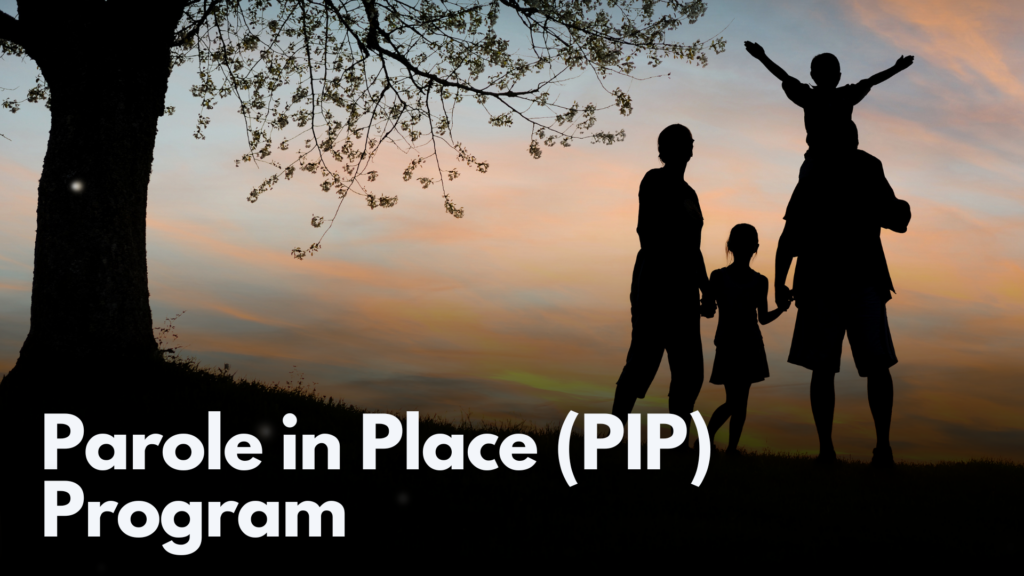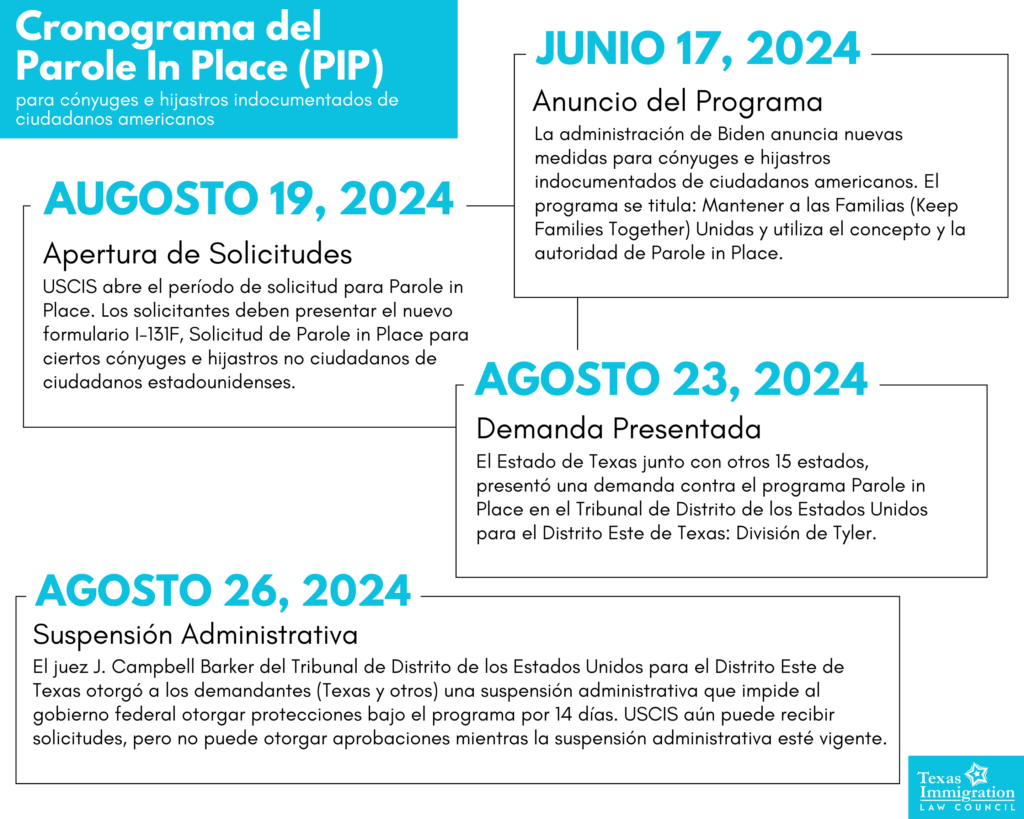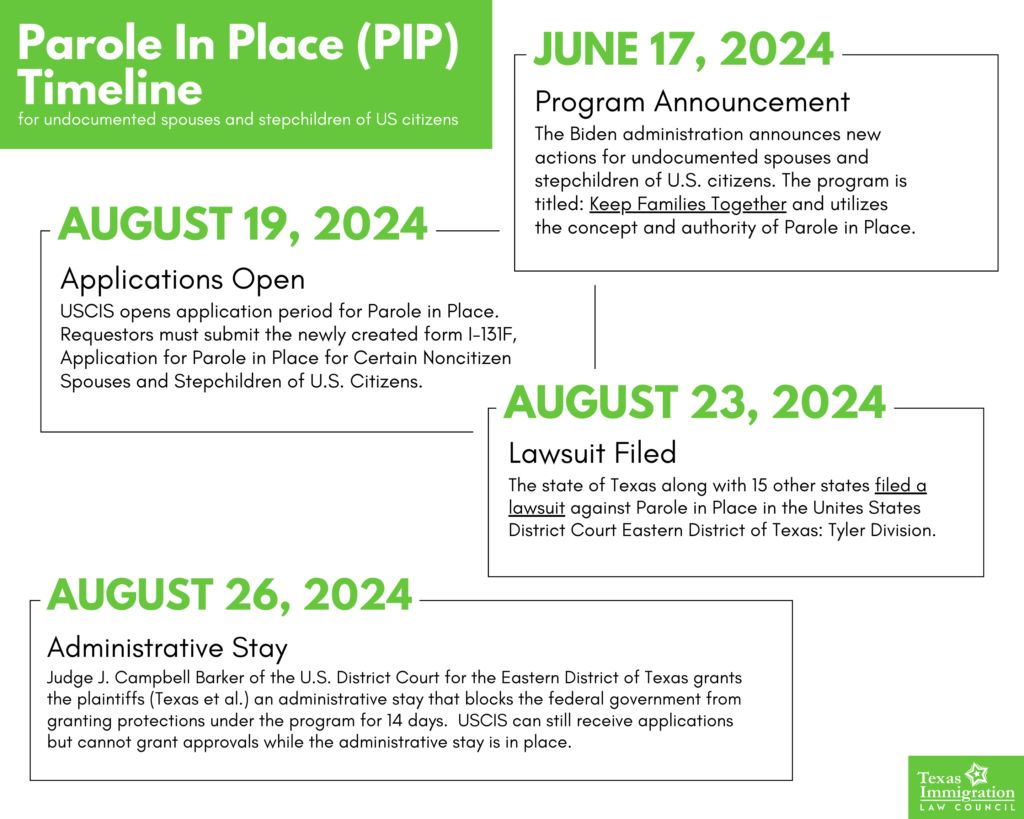
Please note: The United States Citizenship and Immigration Services (USCIS) is an agency within the Department of Homeland Security (DHS). You might see USCIS and DHS used interchangeably.
Important update!
On August 22, 2024, a group of Attorney Generals on behalf of their states including Texas filed a lawsuit against the Department of Homeland Security in an attempt to stop the program. On August 26, a federal court ordered a temporary halt on the approval of Parole in Place applications under this program. USCIS can continue to accept applications but cannot grant parole approvals at this time. The federal court’s order does not affect any applications that were approved before the administrative stay order was issued.
Important Reads

Cronograma del Parole In Place
El 17 de junio de 2024, el presidente Biden anunció que el Departamento de Seguridad Nacional de los EE. UU. (DHS) implementará el programa de Parole in Place (PIP) para cónyuges indocumentados de ciudadanos estadounidenses, con el fin de mantener a las familias unidas. Este cronograma destaca los pasos clave y las fechas importantes de este programa.

Parole In Place Timeline
On June 17, 2024, President Biden announced that the U.S. Department of Homeland Security (DHS) will implement the Parole in Place (PIP) program for undocumented spouses of U.S. citizens to keep families together. This timeline highlights the key steps and important dates for this program.

Free Legal Help Available: Parole in Place for Undocumented Spouses of U.S. Citizens
On June 18, President Biden announced a new executive action using his parole authority to protect certain United States citizens’ spouses without legal status, to apply for Parole in Place (PIP) from the U.S. Department of Homeland Security (DHS).

Use of Notaries for Parole in Place
We understand that filling out a government form may be intimidating, but we want to caution the use of notaries to complete and submit the application for Parole in Place (PIP).
INTRODUCTION TO PIP
WHO: Undocumented spouses of United States citizens and their children.
WHAT: President Biden announced on June 18, 2024 that the U.S. Department of Homeland Security (DHS) will implement two executive actions including the Parole in Place (PIP) for Undocumented Spouses of U.S. Citizens program to ensure that U.S. citizens with undocumented spouses and children can keep their families together. This program could provide eligible individuals with a pathway to permanent residency and eventual citizenship, while also granting them work permit eligibility.
WHEN: On Monday, August 19, 2024, the U.S. Citizenship and Immigration Services (USCIS) began accepting applications.
HOW: Eligibility: To be considered for a discretionary grant of Parole in Place (PIP), on a case-by-case basis, under this process, you must:
- Be present in the United States without admission or parole;
- Have been continuously present in the United States for at least 10 years as of June 17, 2024;
- Have a legally valid marriage to a U.S. citizen as of June 17, 2024;
- Not have any disqualifying criminal history or otherwise constitute a threat to national security or public safety; and
- Otherwise merit a favorable exercise of discretion.
Noncitizen stepchildren of U.S. citizens may also be considered for Parole in Place (PIP) if, as of June 17, 2024, they:
- Were physically present in the U.S. without admission or parole; and
- Had a qualifying stepchild relationship to a U.S. citizen.
ACTION:
Here’s what you can do:
- Do your research! Check if you are eligible for the program. Read our Frequently Asked Questions below and check out the links in our Learn More section.
- Gather Documents: You can begin to prepare to file a parole application by gathering evidence of your eligibility, such as:
- Evidence of a legally valid marriage to a U.S. citizen as of June 17, 2024, such as a marriage certificate or proof of a recognized common law marriage, such as an official file-stamped of Texas’ Declaration and Registration of Informal Marriage; If you are in a common law marriage in Texas, make sure to carefully read the Frequently Asked Questions below and do your research before taking any action.
- Documentation of proof of identity, including expired documents, may include:
- Valid state or country driver’s license or identification;
- Birth certificate with photo identification;
- Valid passport; or
- Any government issued document bearing the requestor’s name, date of birth, and photo.
- Evidence of your spouse’s U.S. citizenship, such as a passport, birth certificate, or Certificate of Naturalization;
- Documentation to establish your continued presence in the United States for at least 10 years, as of June 17, 2024. While more information will be made available in the forthcoming Federal Register Notice and subsequent FAQs, examples of documentation could include copies of:
- Rent receipts or utility bills;
- School records, yours or your children’s (letters, report cards, etc.);
- Hospital or medical records;
- Attestations to your residence by religious entities, unions, or other organizations, identifying you by name;
- Official records from a religious entity confirming participation in a religious ceremony;
- Money order receipts for money sent into or out of the United States;
- Birth certificates of children born in the United States;
- Dated bank transactions;
- Automobile license receipts, title, or registration;
- Deeds, mortgages, or rental agreement contracts;
- Insurance policies; or
- Tax returns or tax receipts.
- For noncitizen stepchildren, evidence of eligibility could include:
- Evidence of the child’s relationship to the noncitizen parent, such as a birth certificate or adoption decree;
- Evidence of the noncitizen parent’s legally valid marriage to a U.S. citizen as of June 17, 2024, such as a marriage certificate; and,
- Evidence of the child’s presence in the United States as of June 17, 2024.
If you are interested in this process, register or update your myUSCIS account. The application is I-131F, Application for Parole in Place for Certain Noncitizen Spouses and Stepchildren of U.S. Citizens. The application can only be submitted online.
3. Seek Legal Help and Beware of Scams: In the U.S., a notary public (notario público) is NOT authorized to provide you with any legal services related to immigration. Only an attorney licensed to practice law in the United States or an accredited representative working for a U.S. Department of Justice-recognized organization can give you legal advice.
Please note, the Texas Immigration Law Council does not provide legal advice or individual assistance. For legal help in Texas, visit the American Immigration Law Association’s Find a Lawyer tool, the Immigration Advocates Network Directory or Texas Law Help’s Legal Directory. Or keep an eye out for legal clinics that provide assistance in your area.
4. Save for Application Fees: The application fee is $580. There is no waiver.
5. Learn more here:
- Visit Texas Immigration Law Council for more updates: www.txilc.org
- TxILC Parole in Place website: www.piptexas.org
- DHS: Federal Register Notice on Implementation of Keeping Families Together (Aug. 20, 2024)
- USCIS: Frequently Asked Questions About Keeping Families Together (Aug. 19, 2024)
- USCIS: Filing Guide for Form I-131F, Application for Parole in Place for Certain Noncitizen Spouses and Stepchildren of U.S. Citizens (Aug. 16, 2024)
- DHS: Fact Sheet: DHS Announces New Process to Promote the Unity and Stability of Families | Homeland Security (July 17, 2024)
- USCIS: Reminders on the Process to Promote the Unity and Stability of Families (July 17, 2024)
FREQUENTLY ASKED QUESTIONS:
APPLICATION PROCESS
1. Who benefits from Biden’s Parole in Place program announcement? What is the process called?
Different names have been used for this program. Keeping Families Together and Parole in Place for Undocumented Spouses and Stepchildren of U.S. Citizens refer to this process. Undocumented people who are married to United States citizens will be considered on a case-by-case basis for a discretionary grant of Parole in Place (PIP), and they must:
- Be present in the United States without admission or parole;
- Have been continuously present in the United States for at least 10 years as of June 17, 2024;
- Have a legally valid marriage to a U.S. citizen as of June 17, 2024;
- Not have any disqualifying criminal history or otherwise constitute a threat to national security or public safety; and
- Otherwise merit a favorable exercise of discretion.
2. If an undocumented spouse of a U.S. citizen has been in the United States for LESS THAN 10 YEARS, as of June 17, 2024, do they still qualify?
No. Unfortunately, an undocumented spouse who cannot prove that they have been continuously present in the U.S. for at least 10 years as of June 17, 2024 — even if they meet all the other requirements — cannot benefit under this Parole in Place program. If you can, consult with an immigration attorney about your options if these are your circumstances.
3. What if an undocumented spouse of a U.S. citizen does not currently live in the U.S. Do they still qualify?
No. Unfortunately, an undocumented spouse of a U.S. citizen does not meet the program requirements under these circumstances because applicants must be present in the U.S. and have been continuously present in the U.S. for at least 10 years as of June 17, 2024, to benefit from this Parole in Place program. If you can, consult with an immigration attorney about your options if these are your circumstances.
4. Can the undocumented child of a noncitizen spouse covered by this policy also be considered for a grant of parole in place under the process? Is there an age limit?
The undocumented stepchildren of U.S. citizens may be considered for this process if the child is physically present in the United States without admission or parole as of June 17, 2024, and has a qualifying stepchild relationship to a U.S. citizen as of that date. To qualify as a stepchild under the Immigration and Nationality Act, the noncitizen child must be unmarried, under the age of 21, and the marriage of their noncitizen parent and U.S. citizen stepparent must have taken place prior to the child’s 18th birthday.
5. When will the application process start?
USCIS started accepting applications on August 19, 2024. If you are eligible, you may submit your application now through the USCIS website.
Important update: Due to a federal court order, USCIS can continue accepting applications, but cannot approve parole applications at this time.
6. What is the application process?
To be considered for parole under this program, an individual will need to file online form “I-131F, Application for Parole in Place for Certain Noncitizen Spouses and Stepchildren of U.S. Citizens” through the USCIS website along with supporting documentation to show they meet the requirements and pay a $580 fee. To start the application, eligible applicants must create a USCIS Online Account. There is no paper version of the application. The online application will automatically determine what evidence an applicant must submit at the time of filing.
Once USCIS receives a correctly filed application, they will review each case individually and decide if granting parole would significantly benefit the public or if there are pressing humanitarian reasons to do so. They’ll also consider whether the applicant deserves a favorable decision. For every request, USCIS will look at the applicant’s past immigration history, any criminal record the applicant might have, results from background checks, information from national security and public safety screenings, and any other relevant information USCIS has or asks for. USCIS will use all this information to make their decision about the parole request.
7. How long will it take to get a decision on my application if I apply?
Application processing times vary, but there have already been credible reports of approvals for applicants who applied on the first day and had other pending applications with biometrics done. USCIS has several tools that individuals can use to request information about their applications submitted to the agency, including the Case Status Online tool.
Important update: Due to a federal court order, USCIS can continue accepting applications, but cannot approve parole applications at this time.
8. What will be the duration of parole? What happens when it ends?
Under this process, a qualifying individual may be granted parole on a case-by-case basis for up to three years. This period provides an opportunity for eligible spouses of U.S. citizens granted parole to file a Form I-485, Application to Register Permanent Residence or Adjust Status (and concurrent Form I-130, Petition for Alien Relative, if applicable). At the conclusion of the parole period, USCIS anticipates that these individuals will have either a pending adjustment application or final adjustment adjudication completed. At this time, DHS has not expressed an intention to renew the parole period after the initial grant expires.
9. What personal or identifying information will I need to provide on the application?
Applicants will need to provide their full name; current mailing address and physical address (if they are different); phone number and any email addresses used; birth date; alien registration number (A Number) if any; country of birth and country of citizenship; gender; marital status, including the date of marriage; U.S. social security number, if any; USCIS online account number; biographical information including height, weight, hair and eye color, and race and ethnicity.
10. How will I prove my identity?
Applicants must provide a copy of an official photo identity documents showing their photo, name, and date of birth. The copy provided must clearly show the photo and identity information. Expired documents are acceptable. This could be:
- A valid government-issued driver’s license;
- A passport identity page;
- Any national identity document from country of origin bearing the applicant’s photo;
- Any school-issued form of identification with a photo, or;
- Any other official document with a photo.
11. What documents do I need to provide to establish that I have been continuously present in the U.S. for at least 10 years, as of June 17, 2024?
See the “ACTION” section above in our program announcement breakdown for examples of documents that can be helpful for your application. Many lawyers are recommending that people at least submit one document for every four months for the 10-year period.
12. What factors does USCIS consider when it talks about “discretion”?
DHS’s decision whether to grant parole in place to a requestor is discretionary, which means the agency will make a case-by-case determination. Even if a requestor establishes that they have met all of the criteria for eligibility, USCIS will examine the totality of the circumstances in the individual case to determine whether the requestor merits a grant of parole in place as a matter of discretion for significant public benefit or urgent humanitarian reasons. In doing so, USCIS will weigh the positive factors against the negative factors that are present in the applicant’s record. Requestors may provide evidence of positive factors to establish that they merit a favorable exercise of discretion, which may relate to, but are not limited to:
- Community ties;
- Advanced or young age;
- Length of presence in the United States;
- Status as a parent or caregiver of a U.S. citizen child or elderly parent or in-law;
- Status as a caregiver for an individual with disabilities, including U.S. citizen in-laws or siblings;
- Physical or mental condition requiring care or treatment in the United States;
- Status as a victim of or witness to a crime or civil rights violation, or labor rights violation under investigation by a labor agency;
- Impact on other family members, including family members who are U.S. citizens and LPRs;
- Status, or that of their U.S. citizen spouse, as a current or former member of the U.S. military; or
- Other positive factors about which the requestor wishes to provide information.
This is a non-exhaustive list of factors; USCIS may consider any relevant fact in the discretionary analysis.
FREQUENTLY ASKED QUESTIONS:
COMMON LAW MARRIAGE / SAME-SEX MARRIAGE / SEPARATION
1. If I live in Texas and have been in a common law marriage with a U.S. citizen as of June 17, 2024, is this marriage eligible for the new Parole in Place program?
In Texas, common law marriage, also known as marriage without formalities or informal marriage, is a valid and legal way for a couple to marry in Texas if certain requirements are met. Texas law states that a common law marriage may be proved by evidence that the couple:
- “agreed to be married”; and
- “after the agreement they lived together in this state as husband and wife”; and they
- “represented to others that they were married.”
Same-sex common law marriages are recognized in Texas in accordance with the U.S. law. Same-sex couples also qualify for the new Parole in Place program if they also meet all requirements as of June 17, 2024.
2. If I am in a common law marriage in Texas, what should I do to establish eligibility for Parole in Place?
While it is not a requirement, couples in Texas can register their common law marriage by filing a Declaration and Registration of Informal Marriage form with the county clerk. For couples in Texas that choose not to declare their common law marriage, other documents such as lease agreements, tax returns, and insurance policies may be requested to “prove” the marriage. Additionally, all married couples must gather the documentation needed to prove the other requirements, such as 10 years of the undocumented spouse’s continuous presence in the U.S., as requested by USCIS.
Note: If you have been in a common law marriage that began before June 17, 2024, you can officially document it through a Declaration and Registration of Informal Marriage in Texas. This document must accurately reflect the true start date of your marriage, even if that occurred years ago. If you have been in a common law marriage that began before June 17, 2024, but decide to obtain a new official marriage certificate dated after June 17, 2024, this may cause you to become ineligible for the Parole in Place program because the program requires that the marriage existed before June 17, 2024. For Texas couples in common law marriages that began before the June 17, 2024 cut-off date, filing a Declaration and Registration of Informal Marriage to document the marriage under Texas law is generally accepted as an official marriage by USCIS and a method to establish eligibility for the program.
3. What if a couple is separated?
As long as you meet the requirements, eligible requestors may apply and be approved for parole in place. However, this might be an issue at the adjustment of status for permanent residency stage.
4. What if my U.S. citizen spouse passed away? Am I still eligible?
If an applicant was married to a U.S. citizen on or before June 17, 2024 and they meet all the other requirements even if the spouse passed away, they are still eligible for Parole in Place. However, depending on how long the death of the U.S. citizen spouse happened, this may cause issues at the adjustment of status for permanent residency stage.
FREQUENTLY ASKED QUESTIONS:
LEGAL ASSISTANCE / FEES / DEADLINES
1. I can’t afford a lawyer. Who can help me in Texas?
Please note, the Texas Immigration Law Council does not provide legal advice or individual assistance. If you need legal help, visit: American Immigration Law Association’s Find a Lawyer tool, Immigration Advocates Network Directory, or Texas Law Help’s Legal Directory. We also recommend keeping an eye out for legal clinics in your area; these are events where attorneys and volunteers can help you complete this application.
2. What is the fee for applying for Parole in Place under the USCIS process? Can the fee be waived?
The application fee is $580. Because the form must be filed online, there is no fee waiver.
3. Is there a deadline to apply for this immigration benefit?
No deadline has been announced. The application period is now open.
Important update: Due to a federal court order, USCIS can continue accepting applications, but cannot approve parole applications at this time.
FREQUENTLY ASKED QUESTIONS:
QUESTIONS RELATED TO POTENTIAL BENEFICIARIES
1. I was lawfully admitted to the United States on a nonimmigrant visa but overstayed my period of authorized stay. Am I eligible for Parole in Place under the process?
No. Parole in Place under this process may be granted only to certain individuals who are present in the United States without admission. This process is not available to those who were previously lawfully admitted to the United States, for example, those who came with a visa. However, an individual may be eligible to apply for adjustment of status to that of lawful permanent resident (LPR) without parole in place if previously lawfully admitted and applying as an immediate relative of a U.S. citizen.
2. If I am in removal proceedings that are pending before an immigration judge, am I eligible for this process? Who will decide my parole application?
Noncitizens in removal proceedings may apply for parole in place under this process before USCIS if they otherwise qualify under this process. USCIS will weigh, on a case-by-case basis, the existence and circumstances of the removal proceedings, as well as the applicant’s positive equities, in determining whether to grant parole in place. However, a noncitizen who is in removal proceedings because they are an enforcement priority under the Guidelines for the Enforcement of Civil Immigration Law, issued by Secretary Mayorkas in September 2021, will be disqualified from receiving parole in place pursuant to this process.
3. If my parole request is pending and I am encountered by U.S. Customs and Border Protection (CBP) or U.S. Immigration and Customs Enforcement (ICE), will I be placed into removal proceedings?
The Guidelines for the Enforcement of Civil Immigration Law direct the Department of Homeland Security to focus its limited resources on noncitizens who pose a threat to our national security, public safety, or border security. An application under this process does not prevent CBP or ICE from taking enforcement action against an individual when otherwise appropriate under applicable law and policy. CBP and ICE reserve the discretion to place these noncitizens in removal proceedings.
4. If USCIS denies my application for parole, will I be placed in removal proceedings?
If USCIS denies a request for parole, USCIS maintains discretion to issue a Notice to Appear (NTA) or refer the case to ICE for possible enforcement action consistent with the Guidelines for the Enforcement of Civil Immigration Law issued by Secretary Mayorkas on September 30, 2021.
5. If I have criminal history, can I apply for parole under this process?
All applicants will undergo checks by USCIS for risks to national security or public safety as part of the application process. Anyone found to be a threat will not be allowed to continue and may be reported to law enforcement. People who pose such threats are not eligible for this process, which aligns with current immigration enforcement priorities. If a threat is identified, the person might be detained, removed from the country, or their case may be sent to other government agencies for further investigation. Certain criminal records will prevent some people from being eligible for this new process. This includes crimes that would normally disqualify someone from becoming a permanent resident, as well as other crimes that, while not automatically disqualifying, are serious enough to warrant exclusion from the process.
All pending criminal charges are disqualifying, regardless of the nature of the charges. A noncitizen may apply for parole in place once those charges are resolved. All felony convictions, including felony driving under the influence (DUI) offenses, are disqualifying. Additionally, disqualifying criminal history includes convictions for the following offenses, regardless of whether the offense is classified as a felony: murder, torture, rape, or sexual abuse; offenses involving firearms, explosive materials, or destructive devices; offenses relating to peonage, slavery, involuntary servitude, and trafficking in persons; aggravated assault; offenses relating to child pornography, sexual abuse or exploitation of minors, or solicitation of minors; domestic violence, stalking, child abuse, child neglect, or child abandonment; and controlled substance offenses (other than simple possession of 30 grams or less of marijuana). For all other crimes that are not automatically disqualifying, an applicant who has been convicted of any crime, including juvenile delinquency dispositions and adult convictions that have been expunged, can still try to prove why they should be eligible despite the criminal record. The presumption of ineligibility based on criminal history only applies to people who have been convicted, not just arrested.
People with criminal history, excluding minor traffic violations, should consult with an attorney or accredited representative before taking action.
5. If I have past criminal history that is not necessarily disqualifying, how can I overcome the presumption that I am ineligible for the program?
Individuals with a criminal record may still be eligible to apply, but they must provide compelling evidence to explain why they should be granted parole. This evidence should include documentation demonstrating positive attributes or mitigating circumstances related to their conviction. The government will evaluate the severity of the offense against these favorable factors. Less serious convictions, or those that do not raise significant public safety concerns, will be easier to overcome. Applicants should submit a comprehensive statement detailing the circumstances of their conviction, any mitigating factors, and positive aspects of their character or achievements. This statement should be accompanied by relevant supporting evidence. The government will consider a range of factors to determine whether an applicant has sufficiently demonstrated their eligibility despite their criminal history.
These are some of the factors will be used to assess whether the presumption of ineligibility can be overcome:
- Age of the conviction(s) (remoteness in time);
- Requestor’s age at the time of the offense and conviction, including whether the requestor was a juvenile at the time of the offense;
- Sentence or penalty imposed;
- Evidence of subsequent rehabilitation;
- Nature of the conviction, including whether the conduct at issue was non-violent;
- Whether the conviction was an isolated offense when considered against the rest of the requestor’s history (including consideration of whether multiple criminal convictions were on the same date and may have arisen out of the same act);
- Existence of a mental or physical condition that may have contributed to the criminal conduct;
- Requestor’s particular vulnerability, including any physical or mental condition requiring treatment or care in the United States;
- Requestor’s status as a victim of or witness to criminal activity, including domestic violence, or civil rights violation or labor rights violation under investigation by a labor agency, particularly if related to the criminal conduct at issue;
- Requestor’s status, or that of their U.S. citizen spouse, as a current or former member of the U.S. military;
- Requestor’s status as the primary caregiver for a U.S. citizen child or elderly parent or inlaw;
- Evidence of requestor’s good character, such as property ties, business ties, or value and service to the community;
- Length of requestor’s presence in the United States;
- Requestor’s status as a caregiver for an individual with disabilities, including U.S. citizen in-laws or siblings;
- Impact on other family members, including family members who are U.S. citizens and LPRs;
- Other factors USCIS considers relevant in its exercise of discretion.
6. If I have a pending immigration application, would I be barred from filing a Parole in Place application?
No, but if this is the case, an applicant should consider consulting with an attorney or accredited representative about whether applying for Parole in Place makes sense given their circumstances.
7. If I have a prior removal order, can I apply for a Parole in Place and receive this immigration benefit?
It depends. If a non-citizen was issued a removal order but did not depart the United States, they will be presumptively ineligible for parole in place under this process. However, DHS will evaluate, in the exercise of its discretion on a case-by-case basis, the facts and circumstances underlying the unexecuted final removal order in determining whether the noncitizen may overcome the presumption of ineligibility and be granted parole. Examples of information that may be relevant to DHS in its determination of whether the requestor has overcome the presumption of ineligibility include, but are not limited to:
- Lack of proper notice of court proceedings;
- Age of the noncitizen at the time the removal order was issued;
- Ineffective assistance of counsel or being a victim of fraud in connection with immigration representation; or
- Other extenuating factors or considerations such as:
- Inability to understand proceedings because of language barriers;
- Status as a victim of domestic violence;
- Other extenuating personal factors, such as requestor’s limited resources (e.g., lack of housing that would have impacted ability to appear);
- A physical or mental condition requiring care or treatment during immigration proceedings.
If a non-citizen departed the United States after being issued a removal order and subsequently reentered, DHS will not grant parole in these cases.
FREQUENTLY ASKED QUESTIONS:
EMPLOYMENT AUTHORIZATION
1. f I am approved for parole, when can I apply for an employment authorization document (EAD)? Can I apply for an EAD at the same time as when I apply for parole?
An individual who is granted parole is immediately eligible to apply for an EAD from USCIS and can do so by submitting a completed Form I-765, Application for Employment Authorization. However, an EAD application cannot be submitted simultaneously with a Parole in Place application. Applicants must wait for a grant first before applying for an EAD.
2. How long will it take to receive a decision on my employment authorization application?
Application processing times vary. USCIS has several tools that individuals can use to request information about their applications submitted to the agency, including the Case Status Online tool.
3. How long will it take to receive a decision on my employment authorization application?
Application processing times vary. USCIS has several tools that individuals can use to request information about their applications submitted to the agency, including the Case Status Online tool.
FREQUENTLY ASKED QUESTIONS:
POSSIBLE LAWSUIT
24. If there is a lawsuit against this new program, how will it affect me if I am eligible for the program?
On August 22, 2024, a group of Attorney Generals on behalf of their states including Texas filed a lawsuit against the Department of Homeland Security in an attempt to stop the program.
On August 26, a federal court ordered a temporary halt on the approval of Parole in Place applications under this program. USCIS can continue to accept applications but cannot grant parole approvals at this time. The federal court’s order does not affect any applications that were approved before the administrative stay order was issued.
However, the long-term impact of a lawsuit on this program is currently uncertain. We recommend that eligible individuals regularly check the USCIS website for updates on the program’s status. In the meantime, we encourage those who may qualify to continue gathering necessary documents for the application and apply if they choose to do so.
Visit Texas Immigration Law Council for more updates: wwww.txilc.org or www.piptexas.org
Please note, Texas Immigration Law Council does not provide legal advice or individual assistance.
If you need legal help, visit: Immigration Advocates Network Directory or Texas Law Help’s Legal Directory.

